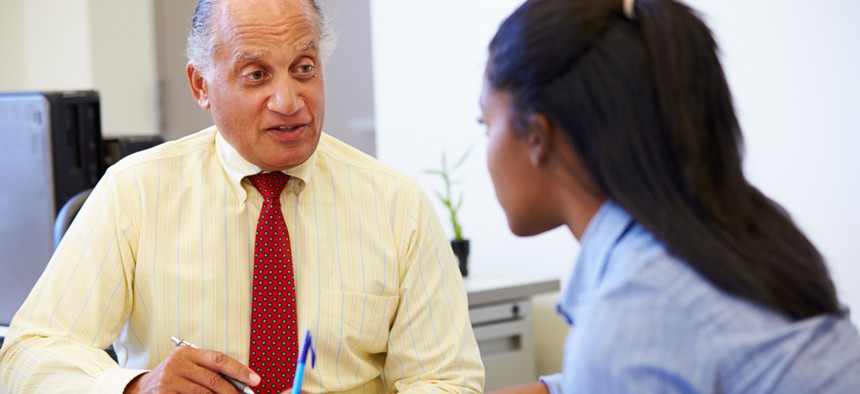Why more mental health counselors are needed in schools

A student sits with a counselor at a table Shutterstock
Nonprofit advocates have not given up on securing more funding in the upcoming state budget. They reiterated their demands for $140 million to address a cost of living adjustment and $25 million in minimum wage funding at a March 5 event in Albany. An event inside the Legislative Office Building near the state Capitol also recognized more than 60 women who were inducted into the Notable Women in Human Services Hall of Fame.
Celebrating the amazing women who are the backbone of the human services sector @NonprofitsNY @HSC_NY @FPWA @NMICnyc #StrongWomen #StrongNonprofits pic.twitter.com/Fk6X1kA9aW
— Maria Lizardo (@marializardo) March 5, 2019
Elected officials joining advocates at the event included state Sen. Roxanne Persaud, chair of the Senate Social Services Committee; Assemblyman Andrew Hevesi, chair of the Assembly Standing Committee on Social Services; Assemblywoman Donna Lupardo; Assemblyman Harvey Epstein; state Sen. Brad Hoylman; and Assemblyman D. Billy Jones.
“We’re in Albany today, not only to recognize the unwavering work of women in the human services sector, but also to call attention to the chronically undervalued work of the sector and its underpaid front-line staff,” FPWA CEO Jennifer Jones Austin said in a March 5 press release. “If the governor and Legislature are serious about improving economic and social justice for all New York women, funding government contracts at levels that pay fair living wages for frontline workers is the first best step."
Two Capital Region nonprofits have received state funding to expand addiction treatment. The Times Union has the details on how Second Chance Opportunities received $350,000 to establish a community center in Albany to help people find housing and employment after they finish addiction treatment. Another $80,000 in funding went to the Prevention Council of Saratoga County to expand a community center in Saratoga Springs.
There is a new member of the board at CoveCare Center. Annie Minella previously served as executive director of the Putnam Hospital Center, where she worked for four decades, according to a March 4 press release. Since moving to Putnam County in 1972, she has volunteered for organizations such as the American Heart Association, the Cystic Fibrosis Association, the Boy Scouts of America, the Girl Scouts of America, Autism Speaks, and the March of Dimes.
A new report from the American Civil Liberties Union examines why more mental health counselors are needed in schools. The report, “Cops and No Counselors,” reviews new data made available after the federal Department of Education required that public schools report how many social workers, nurses and psychologies they have on staff. While other studies have shown that more mental health services increase graduation rates, lower disciplinary incidents, and improve overall academic performance, many schools still lack adequate resources. Here are a few key findings, taken more or less verbatim from the report.
- About 1.7 million students are in schools with police but no counselors.
- Three million students are in schools with police but no nurses.
- Six million students are in schools with police but no school psychologists.
- Ten million students are in schools with police but no social workers.
- Fourteen million students are in schools with police but no counselor, nurse, psychologist, or social worker.